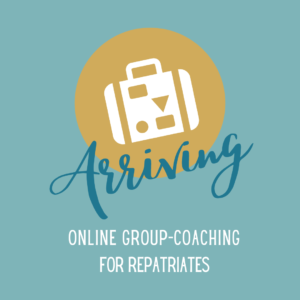Arriving in Limbo
The Corona pandemic has turned all our lives upside down and confronted us with unexpected challenges. It also hit many expats hard in 2020/21. It affects those who had just started their adventure abroad and are struggling to familiarize themselves with the new environment. It also affects those who have already been abroad for a longer period of time, but who now have to cope with a severely restricted daily routine and are plagued by homesickness because they cannot go on home leave or receive any visitors. Those who are just now returning from abroad are also facing quite a struggle. Because even if it seems like the easiest option at first glance, returnees have to overcome very special hurdles when they arrive home.
Reentry is a transition process
The process of arrival and adjustment that returning from abroad entails (quite independently of Covid) is underestimated by many. While the physical move has long been accomplished, our souls need more time.
We must take a rest from time to time and allow our souls to catch up with us.
And precisely because we have the expectation that everything will be much easier when we go home, feelings of shame, guilt and self-doubt add to the initial disorientation.
I should be adjusting faster, don’t make such a fuss. I should be happier, I wanted it that way. Why did I put my family through all this? Was it worth it?
No real goodbye
Now, if we add the Corona pandemic on top of that, it’s twice as hard as it would be under normal conditions. Healthy farewells require celebrating them consciously, cherishing the friends and places we learned to love abroad. If this is limited due to Covid measures, it becomes more difficult to process the time abroad in a healthy way.
Unexpected and early reentry
For some expats, reentry came suddenly and at short notice, sometimes ordered by the company. There were great concerns for an increased risk of contagion and travel bans. For them, there was very little time to organize the move and virtually no chance to say good-bye as planned.
What makes it so hard is the experienced loss of control and the feeling of being on the run from a lethal threat.
Upon arrival in their home country, repats face a period of quarantine paired with living in temporary housing, making it nearly impossible to settle in and establish a new home. Sudden evacuations also repeatedly affect expatriates in politically unstable countries and can leave deep, traumatic traces that should be psychologically attended to.
Family Separation
As I write this, it seems surreal, but it has happened this way to numerous expats in my network. In the beginning, this whole pandemic was thought to be over in a matter of weeks, a few months at most. This led to some expats deciding to continue their work on site while sending their families on extended home leave. Or there were other constellations that resulted in family separation, the wellbeing of the children being the primary focus. No one could have guessed how long the pandemic would keep everyone grounded and that they would have to lead a long-term long-distance relationship while living out of a suitcase. Lost in limbo.
Those affected had to cope with great hardship.
Also taking pets back home was often only possible under difficult conditions. Due to limited flight options, it was a whole new adventure to transport pets. I’ve heard stories about a dog that could only get a flight months later and a cat that travelled for days via mind-boggling detours through Tokyo and Moscow.
Arriving with obstacles
An important part of arriving and resettling in the home country for all family members are social contacts. And these are so very limited during Corona that you must be grateful if you get a chance to see at least the closest family members. Many other contacts simply cannot yet be reestablished in the way you had anticipated. When you return to a completely new region of your home country, you start from scratch again.
It’s a life between worlds, without being able to find closure for the old and fully engage with the new.
Parents are worried about their children, settling in at the new daycare center or school is constantly interrupted, and carefree play with other children is still not possible. Teenagers have a particularly hard time connecting virtually with their peers and establishing their circle of friends. For the expat partner, the return to work or the search for a new job is difficult, because the job market remained in a state of shock for a long time. Daycare is not always available.
In an interview, I asked my colleague Rebecca Lüppen about what it was like for her to return from abroad with her family of six just two weeks before the first lockdown. You can find our 30-minute Zoom interview on YouTube YouTube and a summary of the most important key messages in my next blog article
What helps?
It is essential to acknowledge that returning home in times of a pandemic represents a major multifaceted psychological challenge. Those who can fall back on strong inner resources will be able to manage better. However, these resources are put to a hard and especially long test as the pandemic painfully drags out the arrival process. Self-care is essential! Saying goodbye always involves grief. It’s important to allow yourself the necessary time to process and recharge.
No one needs to do this alone.
Partners, family, friends, employers – everyone can support, and you should demand it. However, if everyone’s batteries are running low, there is the option of seeking professional help. There is counseling available over Corona hotlines, but they may not be specifically familiar about the challenges of reentry. Qualified therapeutic support for children, adolescents and adults should not be skimped on. Feel free to contact me for recommendations from my network.
Exchanging experiences with other returnees who are going through something very similar is gold.
It allows you to find empathic listeners and the possibility to talk the burden off your chest. You will no longer feel like you’re the only one affected. One difficulty I see though is when people permanently pull each other down and persist in lamenting.
For those who want to proactively do something for their well-being, I strongly recommend reentry coaching. I offer this as individual coaching or as group coaching. Together with my colleague Christina Kapaun, we have developed a three-month online group coaching for repats, in which participants can exchange ideas in a safe environment and are professionally accompanied by us in their arrival process. The topics and all further information about our “Arriving” program can be found here.

The experience with our participants has shown that the group coaching has triggered a powerful dynamic in them to work on their personal development. Despite the pandemic, they were able to make great progress and arrive more and more at home and within themselves.

